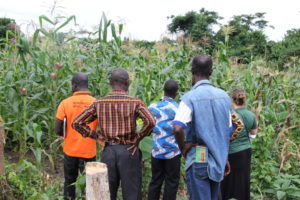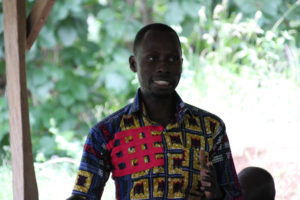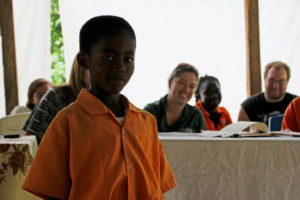
“Some children have to walk 8 kilometers [5 miles] to come to school in the morning,” the Headmaster told me. “The children arrive hungry.”
“When the pupils come to school hungry, they don’t pay attention,” the assistant headmaster, Godfrey, added in. “It’s very difficult to teach them.”

Inspecting the school farm
It was August and the school year was about to start. The teachers and parents gathered in Timeabu, Ghana were asking for a partnership. Fathers offered to cultivate a community farm to grow the high-protein corn – called Quality Protein Maize (QPM) – that would go into the breakfast porridge. Mothers were ready to volunteer their time in the morning: to fetch the firewood, to boil the water, to prepare the breakfast porridge. Teachers came to the meeting despite it being summer break to join in the appeal knowing their students would do better if they could get breakfast before class each morning.
And you answered their call. Thanks to your generous support, the children in Timeabu primary school are now eating a daily breakfast porridge – called “koko” locally. The protein-rich breakfast supports proper childhood brain development, and the additives give them the energy they need to focus in the classroom.

Godfrey shares benefits of daily breakfast
“Koko helps kill our hunger,” said Joseph, a student in Class 1.
“Now, the pupils come to school early because of the breakfast – they like the taste of the koko,” Godfrey reported. “Their concentration is better. Their commitment [to learning] is high. Even our enrollment is gradually increasing.”

Joseph, 1st grade, says “Koko kills our hunger”
As promised, one parent is volunteering her time to make the porridge each morning. Thanks to your support, we delivered seeds and other inputs to the School Management Committee, and they are now cultivating the corn that will go into the porridge next season. If needed, we will offer agricultural training to the members of the School Management Committee to ensure they are able to maximize yields. When harvest comes, thanks to your support, we will take grain storage bags to the school to decrease post-harvest loss so as much of the food they grow as possible can be used for the children’s breakfast.
“The children used to come to school hungry,” the Headmaster concluded. “Now, the children come early and are enthusiastic. We are so grateful.”

Powered by Wapiti Digital #servetheherd

Join us on Wednesday, February 11th @ 5:30-7:30 PM
Sip wine, nibble on tasty bites, and help spread love across the globe!
This is my rich text.
This is more rich text.
I am a list
Lists are cool